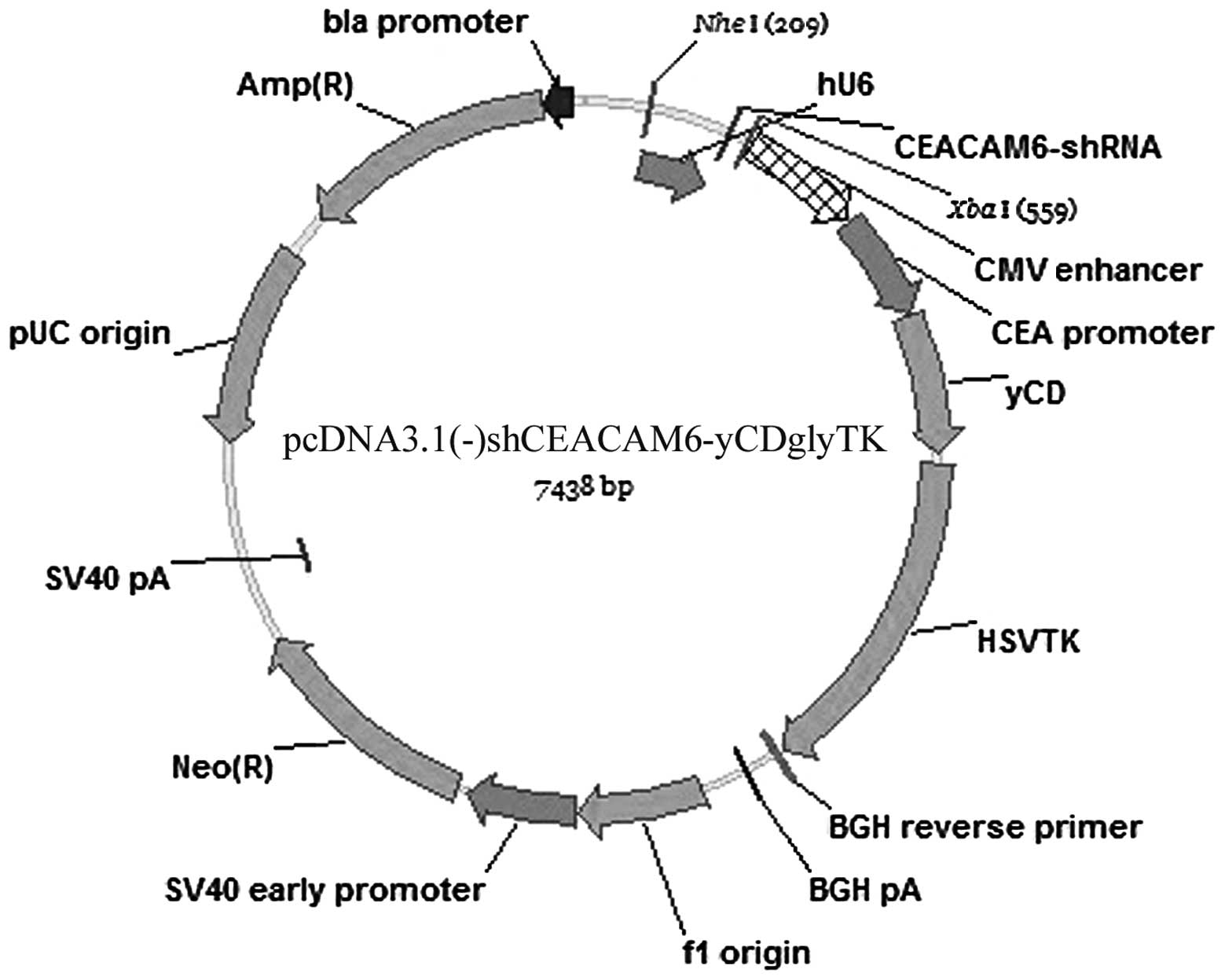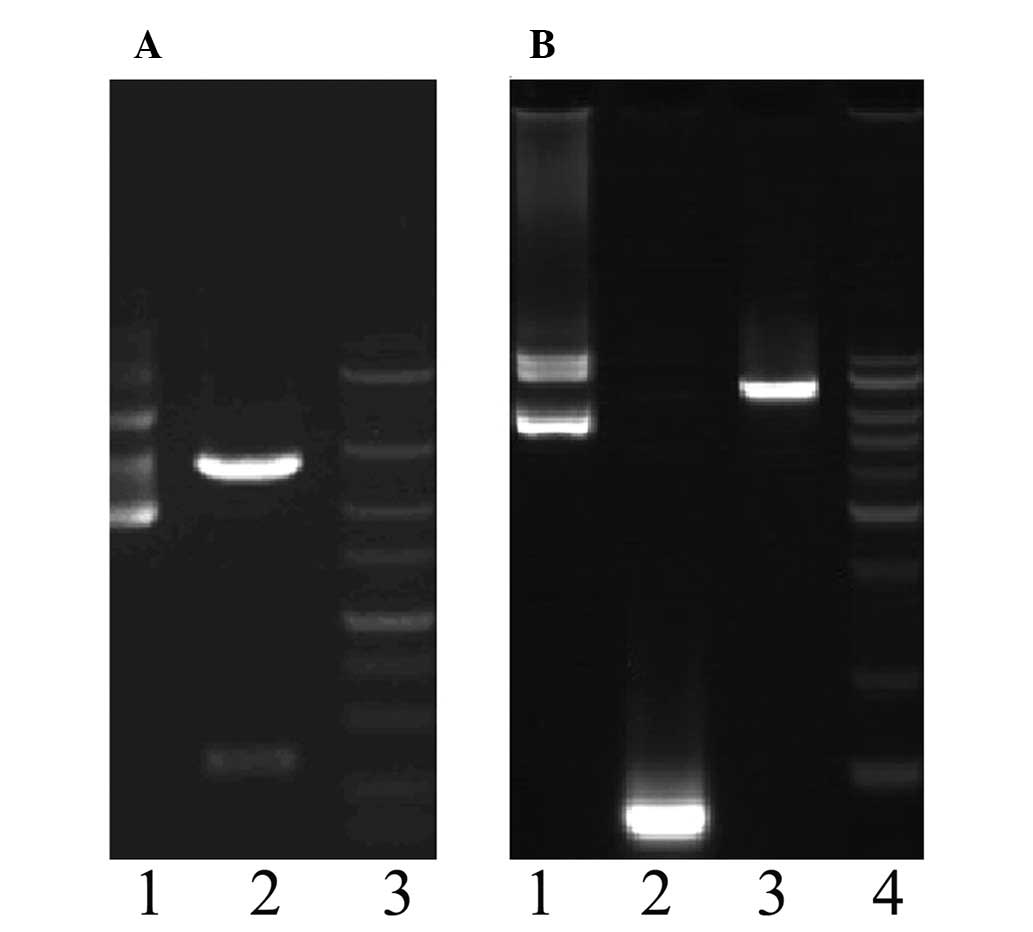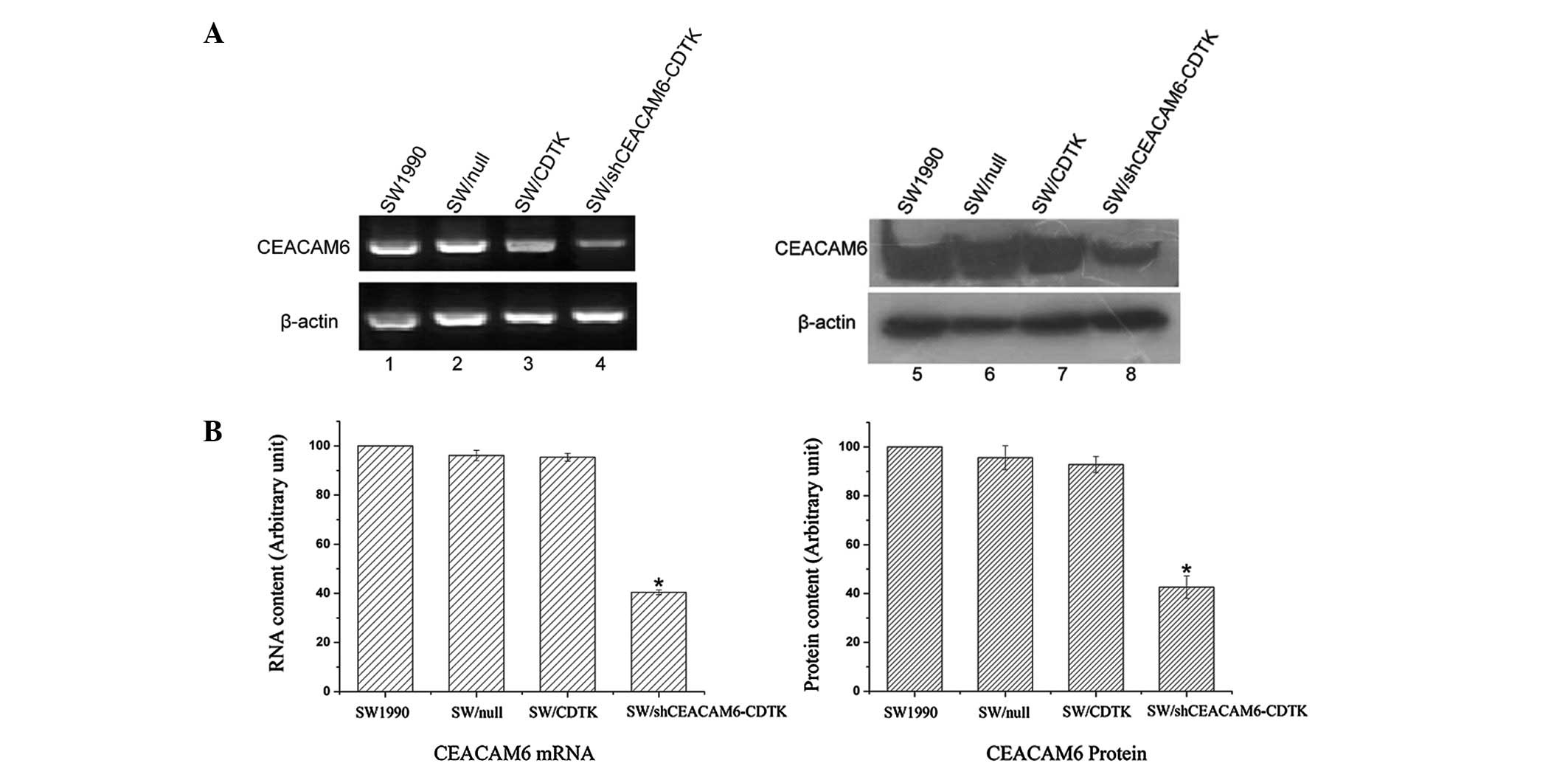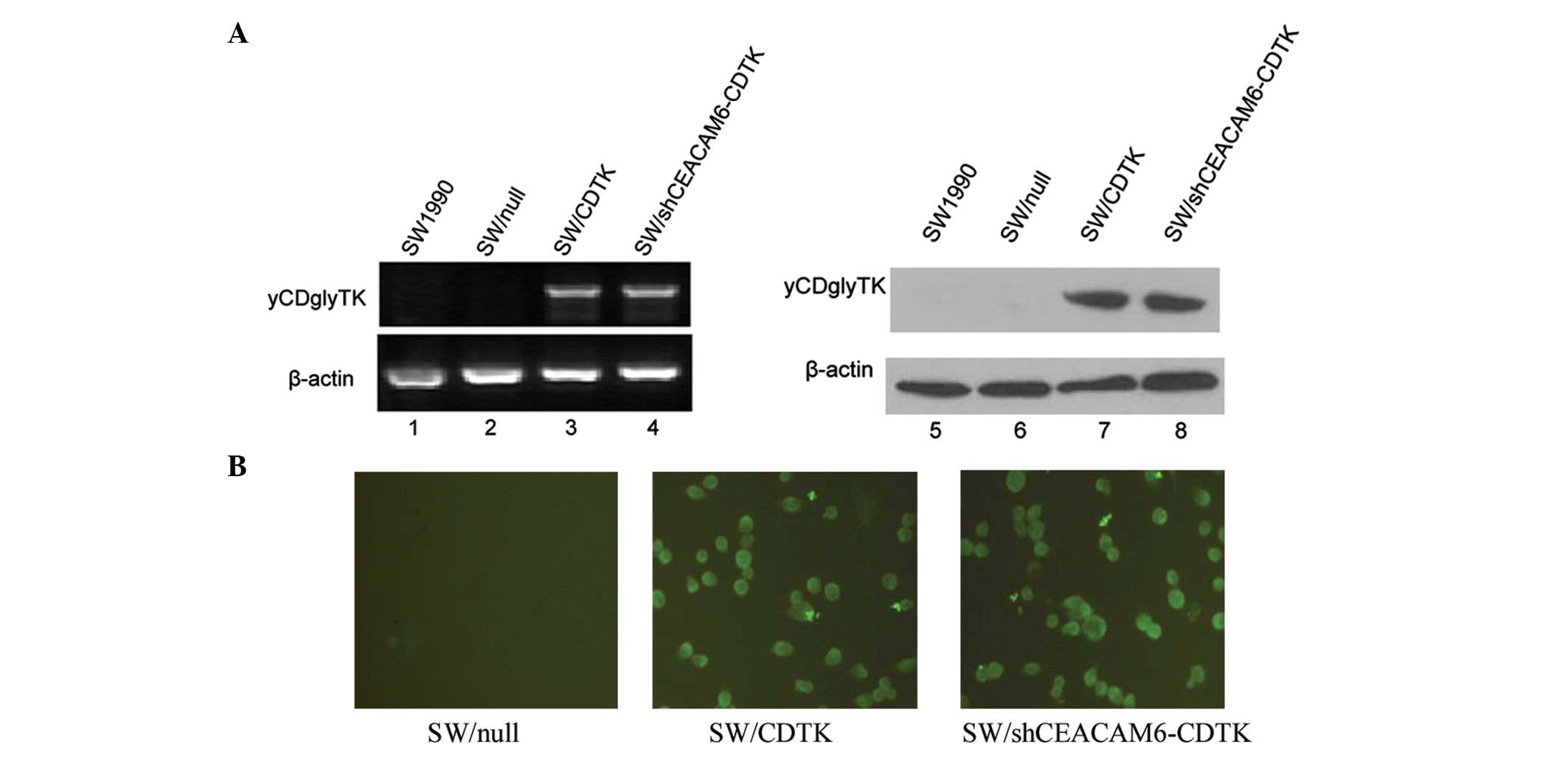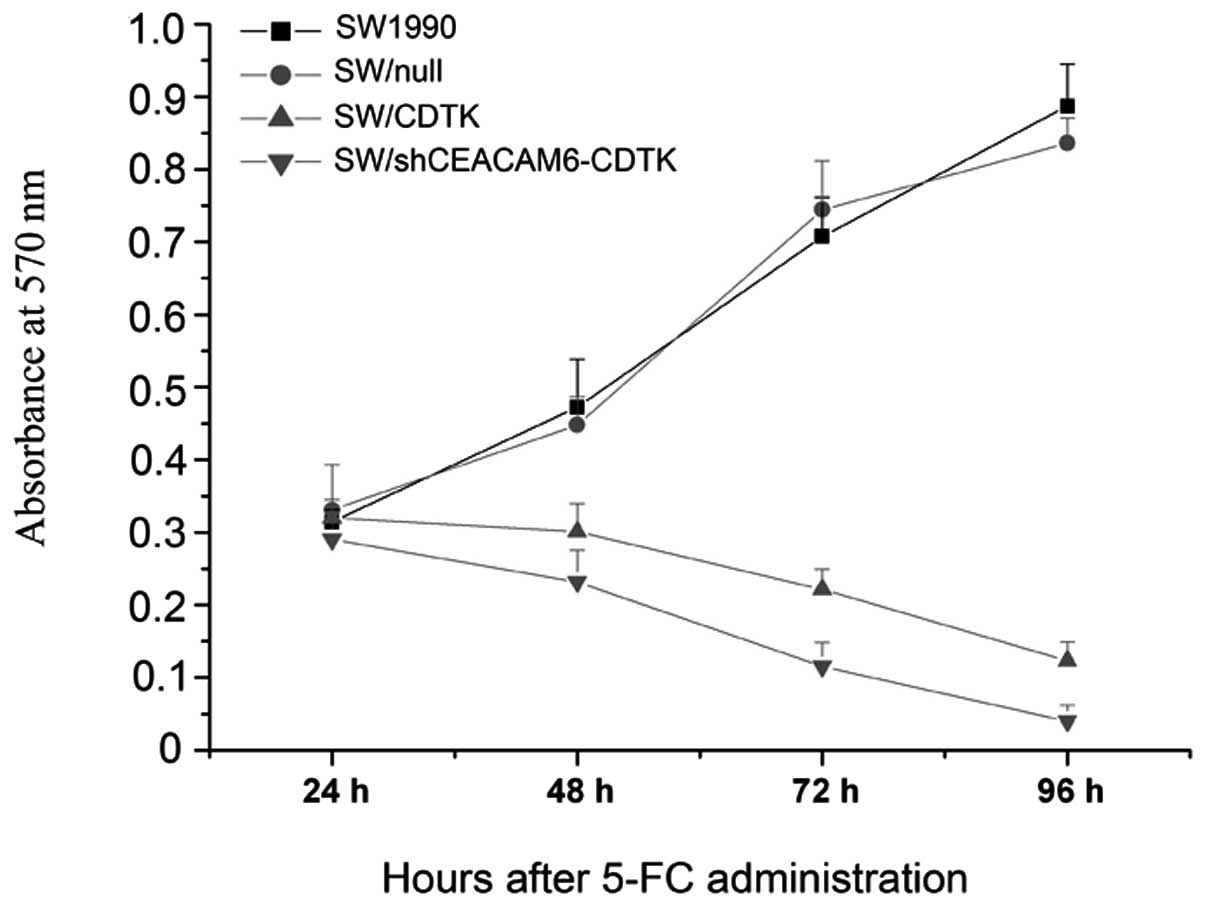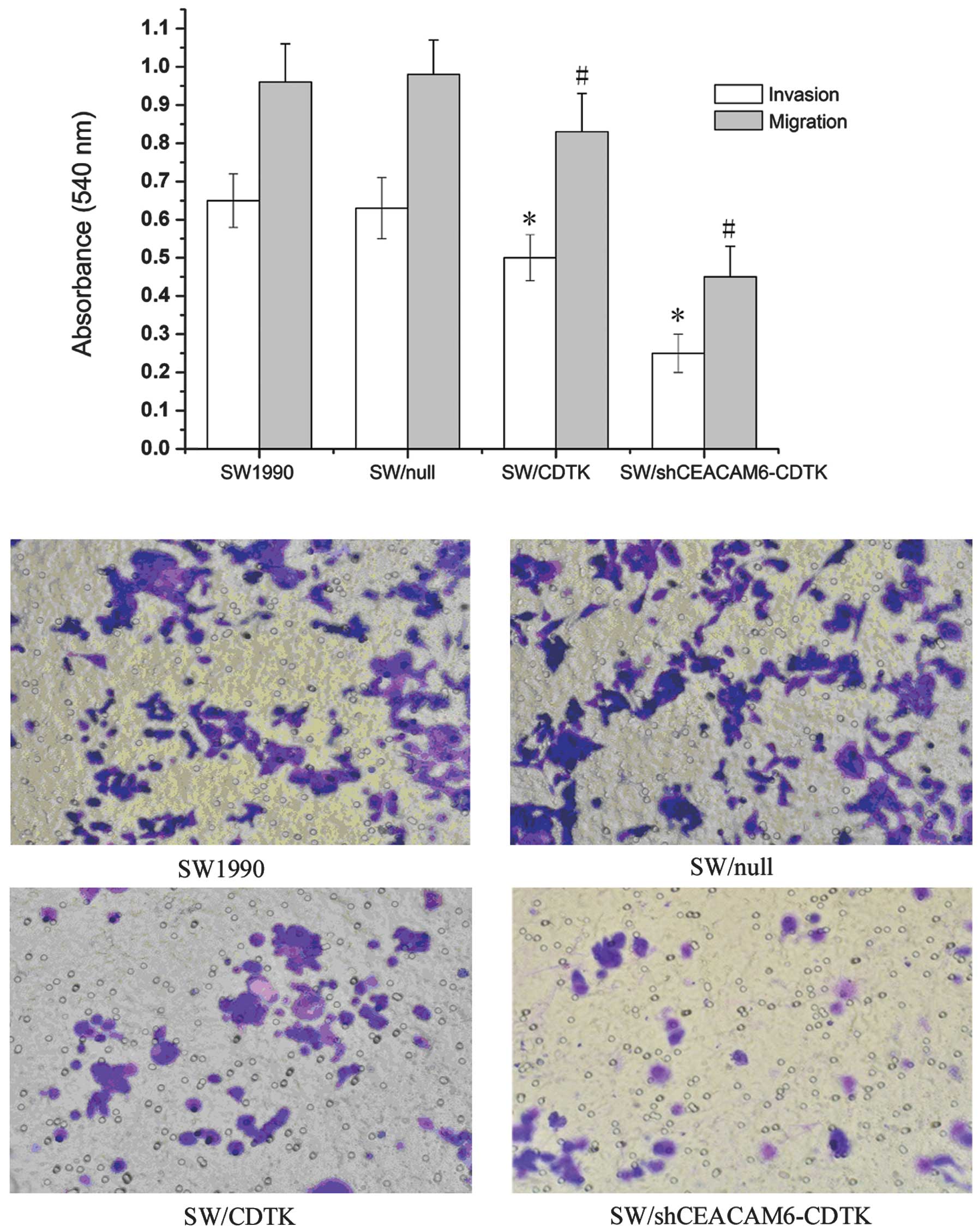|
1
|
Jemal A, Siegel R, Xu J and Ward E: Cancer
statistics. CA Cancer J Clin. 60:277–300. 2010.
|
|
2
|
Bond-Smith G, Banga N, Hammond TM and
Imber CJ: Pancreatic adenocarcinoma. BMJ. 344:e24762012. View Article : Google Scholar : PubMed/NCBI
|
|
3
|
Arlt A, Gehrz A, Muerkoster S, et al: Role
of NF-kappaB and Akt/PI3K in the resistance of pancreatic carcinoma
cell lines against gemcitabine-induced cell death. Oncogene.
22:3243–3251. 2003. View Article : Google Scholar : PubMed/NCBI
|
|
4
|
Stathis A and Moore MJ: Advanced
pancreatic carcinoma: current treatment and future challenges. Nat
Rev Clin Oncol. 7:163–172. 2010. View Article : Google Scholar : PubMed/NCBI
|
|
5
|
Hedley D, Ogilvie L and Springer C:
Carboxypeptidase-G2-based gene-directed enzyme-prodrug therapy: a
new weapon in the GDEPT armoury. Nat Rev Cancer. 7:870–879. 2007.
View Article : Google Scholar : PubMed/NCBI
|
|
6
|
Nawa A, Tanino T, Luo C, et al: Gene
directed enzyme prodrug therapy for ovarian cancer: could GDEPT
become a promising treatment against ovarian cancer. Anticancer
Agents Med Chem. 8:232–239. 2008. View Article : Google Scholar
|
|
7
|
Shah K: Mesenchymal stem cells engineered
for cancer therapy. Adv Drug Deliv Rev. 64:739–748. 2012.
View Article : Google Scholar : PubMed/NCBI
|
|
8
|
Ahn YH, Yi H, Shin JY, et al: STAT3
silencing enhances the efficacy of the HSV.tk suicide gene in
gastrointestinal cancer therapy. Clin Exp Metastasis. 29:359–369.
2012. View Article : Google Scholar : PubMed/NCBI
|
|
9
|
Niu HX, Du T, Xu ZF, Zhang XK and Wang RG:
Role of wild type p53 and double suicide genes in interventional
therapy of liver cancer in rabbits. Acta Cir Bras. 27:522–528.
2012. View Article : Google Scholar : PubMed/NCBI
|
|
10
|
Barnett T, Goebel SJ, Nothdurft MA and
Elting JJ: Carcinoembryonic antigen family: characterization of
cDNAs coding for NCA and CEA and suggestion of nonrandom sequence
variation in their conserved loop-domains. Genomics. 3:59–66. 1988.
View Article : Google Scholar : PubMed/NCBI
|
|
11
|
Kuroki M, Matsushita H, Matsumoto H,
Hirose Y, Senba T and Yamamoto T: Nonspecific cross-reacting
antigen-50/90 (NCA-50/90) as a new tumor marker. Anticancer Res.
19:5599–5606. 1999.PubMed/NCBI
|
|
12
|
Blumenthal RD, Hansen HJ and Goldenberg
DM: Inhibition of adhesion, invasion, and metastasis by antibodies
targeting CEACAM6 (NCA-90) and CEACAM5 (carcinoembryonic antigen).
Cancer Res. 65:8809–8817. 2005. View Article : Google Scholar : PubMed/NCBI
|
|
13
|
Poola I, Shokrani B, Bhatnagar R, DeWitty
RL, Yue Q and Bonney G: Expression of carcinoembryonic antigen cell
adhesion molecule 6 oncoprotein in atypical ductal hyperplastic
tissues is associated with the development of invasive breast
cancer. Clin Cancer Res. 12:4773–4783. 2006. View Article : Google Scholar
|
|
14
|
Blumenthal RD, Leon E, Hansen HJ and
Goldenberg DM: Expression patterns of CEACAM5 and CEACAM6 in
primary and metastatic cancers. BMC Cancer. 7:22007. View Article : Google Scholar : PubMed/NCBI
|
|
15
|
Duxbury MS, Matros E, Ito H, Zinner MJ,
Ashley SW and Whang EE: Systemic siRNA-mediated gene silencing: a
new approach to targeted therapy of cancer. Ann Surg. 240:667–676.
2004.PubMed/NCBI
|
|
16
|
Strickland LA, Ross J, Williams S, et al:
Preclinical evaluation of carcinoembryonic cell adhesion molecule
(CEACAM) 6 as potential therapy target for pancreatic
adenocarcinoma. J Pathol. 218:380–390. 2009. View Article : Google Scholar : PubMed/NCBI
|
|
17
|
Liu T, Zhang G, Chen Y, et al: Tissue
specific expression of suicide genes delivered by nanoparticles
inhibits gastric carcinoma growth. Cancer Biol Ther. 5:1683–1690.
2006. View Article : Google Scholar : PubMed/NCBI
|
|
18
|
Lee SW, Lee YL, Lee YJ, et al: Enhanced
antitumor effects by combination gene therapy using MDR1 gene shRNA
and HSV1-tk in a xenograft mouse model. Cancer Lett. 291:83–89.
2010. View Article : Google Scholar : PubMed/NCBI
|
|
19
|
Rainov NG: A phase III clinical evaluation
of herpes simplex virus type 1 thymidine kinase and ganciclovir
gene therapy as an adjuvant to surgical resection and radiation in
adults with previously untreated glioblastoma multiforme. Hum Gene
Ther. 11:2389–2401. 2000. View Article : Google Scholar
|
|
20
|
Boucher PD, Im MM, Freytag SO and Shewach
DS: A novel mechanism of synergistic cytotoxicity with
5-fluorocytosine and ganciclovir in double suicide gene therapy.
Cancer Res. 66:3230–3237. 2006. View Article : Google Scholar : PubMed/NCBI
|
|
21
|
Rubsam LZ, Davidson BL and Shewach DS:
Superior cytotoxicity with ganciclovir compared with acyclovir and
1-beta-D-arabinofuranosylthymine in herpes simplex virus-thymidine
kinase-expressing cells: a novel paradigm for cell killing. Cancer
Res. 58:3873–3882. 1998.
|
|
22
|
Tomicic MT, Thust R and Kaina B:
Ganciclovir-induced apoptosis in HSV-1 thymidine kinase expressing
cells: critical role of DNA breaks, Bcl-2 decline and caspase-9
activation. Oncogene. 21:2141–2153. 2002. View Article : Google Scholar : PubMed/NCBI
|
|
23
|
Zhang JF, Wei F, Wang HP, et al: Potent
anti-tumor activity of telomerase-dependent and HSV-TK armed
oncolytic adenovirus for non-small cell lung cancer in vitro and in
vivo. J Exp Clin Cancer Res. 29:522010. View Article : Google Scholar : PubMed/NCBI
|
|
24
|
Miyagi T, Koshida K, Hori O, et al: Gene
therapy for prostate cancer using the cytosine deaminase/uracil
phosphoribosyltransferase suicide system. J Gene Med. 5:30–37.
2003. View
Article : Google Scholar : PubMed/NCBI
|
|
25
|
Kievit E, Bershad E, Ng E, et al:
Superiority of yeast over bacterial cytosine deaminase for
enzyme/prodrug gene therapy in colon cancer xenografts. Cancer Res.
59:1417–1421. 1999.PubMed/NCBI
|
|
26
|
Moriuchi S, Wolfe D, Tamura M, et al:
Double suicide gene therapy using a replication defective herpes
simplex virus vector reveals reciprocal interference in a malignant
glioma model. Gene Ther. 9:584–591. 2002. View Article : Google Scholar
|
|
27
|
Hammarstrom S: The carcinoembryonic
antigen (CEA) family: structures, suggested functions and
expression in normal and malignant tissues. Semin Cancer Biol.
9:67–81. 1999. View Article : Google Scholar : PubMed/NCBI
|
|
28
|
Jantscheff P, Terracciano L, Lowy A, et
al: Expression of CEACAM6 in resectable colorectal cancer: a factor
of independent prognostic significance. J Clin Oncol. 21:3638–3646.
2003. View Article : Google Scholar : PubMed/NCBI
|
|
29
|
Lewis-Wambi JS, Cunliffe HE, Kim HR,
Willis AL and Jordan VC: Overexpression of CEACAM6 promotes
migration and invasion of oestrogen-deprived breast cancer cells.
Eur J Cancer. 44:1770–1779. 2008. View Article : Google Scholar : PubMed/NCBI
|
|
30
|
Duxbury MS, Ito H, Benoit E, Waseem T,
Ashley SW and Whang EE: A novel role for carcinoembryonic
antigen-related cell adhesion molecule 6 as a determinant of
gemcitabine chemoresistance in pancreatic adenocarcinoma cells.
Cancer Res. 64:3987–3993. 2004. View Article : Google Scholar : PubMed/NCBI
|
|
31
|
Ordonez C, Screaton RA, Ilantzis C and
Stanners CP: Human carcinoembryonic antigen functions as a general
inhibitor of anoikis. Cancer Res. 60:3419–3424. 2000.PubMed/NCBI
|
|
32
|
Zhu Z, Sanchez-Sweatman O, Huang X, et al:
Anoikis and meta-static potential of cloudman S91 melanoma cells.
Cancer Res. 61:1707–1716. 2001.PubMed/NCBI
|
|
33
|
Duxbury MS, Ito H, Zinner MJ, Ashley SW
and Whang EE: CEACAM6 gene silencing impairs anoikis resistance and
in vivo metastatic ability of pancreatic adenocarcinoma cells.
Oncogene. 23:465–473. 2004. View Article : Google Scholar : PubMed/NCBI
|
|
34
|
Duxbury MS, Ito H, Benoit E, Ashley SW and
Whang EE: CEACAM6 is a determinant of pancreatic adenocarcinoma
cellular invasiveness. Br J Cancer. 91:1384–1390. 2004. View Article : Google Scholar : PubMed/NCBI
|
|
35
|
Takeichi M: Cadherins in cancer:
implications for invasion and metastasis. Curr Opin Cell Biol.
5:806–811. 1993. View Article : Google Scholar : PubMed/NCBI
|
|
36
|
Birchmeier W and Behrens J: Cadherin
expression in carcinomas: role in the formation of cell junctions
and the prevention of invasiveness. Biochim Biophys Acta.
1198:11–26. 1994.PubMed/NCBI
|
|
37
|
Shi Y: Mammalian RNAi for the masses.
Trends Genet. 19:9–12. 2003. View Article : Google Scholar
|
|
38
|
Kuroki M, Matsuo Y, Kinugasa T and
Matsuoka Y: Three different NCA species, CGM6/CD67, NCA-95, and
NCA-90, are comprised in the major 90 to 100-kDa band of
granulocyte NCA detectable upon SDS-polyacrylamide gel
electrophoresis. Biochem Biophys Res Commun. 182:501–506. 1992.
View Article : Google Scholar : PubMed/NCBI
|
|
39
|
Barnich N, Carvalho FA, Glasser AL, et al:
CEACAM6 acts as a receptor for adherent-invasive E. coli,
supporting ileal mucosa colonization in Crohn disease. J Clin
Invest. 117:1566–1574. 2007. View
Article : Google Scholar : PubMed/NCBI
|
|
40
|
Carvalho FA, Barnich N, Sivignon A, et al:
Crohn’s disease adherent-invasive Escherichia coli colonize
and induce strong gut inflammation in transgenic mice expressing
human CEACAM. J Exp Med. 206:2179–2189. 2009.
|















